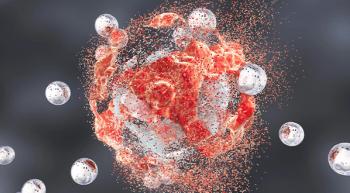
Avoiding surgery for rectal cancer, Sarah Rack of Memphis traveled to Houston for treatment every three weeks for 18 months.

Avoiding surgery for rectal cancer, Sarah Rack of Memphis traveled to Houston for treatment every three weeks for 18 months.

Patients with GIST have more treatment options than ever, with others currently under development.

HIF-2 alpha inhibitors are transforming therapy for patients with renal cell carcinoma and von Hippel-Lindau disease.

When Sean Korbitz was a 20-year-old college student, his life trajectory changed with a rare cancer diagnosis, resulting in the removal of 40 tumors; fifteen years later, a new drug made him feel like a “medical miracle.”

“Novel approaches to immunotherapy, targeted therapy and combinations with standard chemotherapy are all areas of current research interest,” says an expert at Dana-Farber Cancer Institute Sarcoma Center in Boston. “(Secondary breast cancer) can be very challenging when it recurs, so we need to continue to work toward improving systemic therapies through ongoing international trials and collaboration across the community of patients and physicians. That’s what’s going to help us improve outcomes.”

Seven years after completing breast cancer treatment, Angelia Carpenter was shocked to discover she had angiosarcoma, a rare cancer that may have been associated with her breast cancer treatment.

When cancer harms the body’s ability to make antibodies, what does that mean for the efficacy of vaccines?

When cancer treatments stop working, it is not the end of the line. Most patients with advanced disease will be on continuous therapy, and that means trying different options along the way.

Increasingly, researchers are playing matchmaker between patients with metastatic cancer and targeted drugs via studies called basket trials.

Drugs that target certain gene mutations are improving survival rates for patients with lung cancer.

Salivary cancer is a rare disease that has some of the greatest variances of all types of cancer.

New biological advances are giving patients and their care teams a better understanding of cervical cancer — a disease that affects thousands each year.

Patients with relapsed and resistant diffuse large B-cell lymphoma can look to new treatments beyond tried-and-true chemotherapy.

As immunotherapies emerge in the treatment of liver cancer, experts examine whether two or more is better than one.

Understand how the rare relative of ovarian cancer is diagnosed and treated.

Targeted therapies, immunotherapies and combinations add new weapons to fight against non-Hodgkin lymphoma.

Instead of undergoing surgery for potential cancer, many people with thyroid nodules can safely opt for surveillance.

Pregnancy can lead to a rare cancer known as gestational trophoblastic neoplasia.

How patients with operable non-small cell lung cancer are faring after tumor resection.

Once considered “immunologically silent,” breast cancer may actually respond to immunotherapy.

Triple wild-type melanoma may not respond to approved targeted drugs, but immunotherapy can be an excellent option.

Scientists are investigating a host of new treatment types that may change the outlook for those with pancreatic cancer.

Four new drugs, and novel treatment combinations, are further extending life expectancy for patients with multiple myeloma.

For some patients, doctors recommend treatment after surgery to reduce the risk of melanoma developing again.

Surviving melanoma can mean lifelong skin checks, scars and, in some cases, long-term medical treatment.

Until recently, detecting lung cancer at an early, more treatable stage was a rare or chance event.

"I always felt that I would get breast cancer. It was only a question of when," says Shari Levy. Levy's mother died of breast cancer, and Levy, who has dense breasts, has had five breast biopsies.

The latest tweaks to medical strategies can improve outcomes while accommodating the preferences of women with earlier-stage breast cancers.

Because lymphedema can occur years after surgery, it's important to be aware of the area where the lymph nodes were removed or radiated.

The condition can be managed, and new treatments are being investigated.

Published: November 3rd 2021 | Updated:

Published: March 17th 2022 | Updated:

Published: September 23rd 2022 | Updated:

Published: July 14th 2021 | Updated:

Published: September 25th 2014 | Updated:

Published: April 28th 2017 | Updated: